The cavity has high accuracy and a wide range; the cavityless is easy to clean and is suitable for liquid pressure measurement with impurities. Pressure sensors are usually used in chemical, metallurgical, aerospace, and other industries.
TBP-1 Diffused Silicon Pressure Sensor
Mainly used to measure the oil pressure, cylinder pressure and hydraulic pressure of the system. Widely used in aerospace, metallurgy, petrochemical, medicine fields.
TBP-3 Cavityless Diffused Silicon Pressure Transducer
Widely used in aerospace, metallurgy, petrochemical, medicine, and other automatic control fields.
Diffused Silicon Pressure Sensor Advantages
Long-Term Stability of the silicon diaphragm pressure sensor : One of the most significant advantages of a Diffused Silicon Pressure Sensor is its long-term stability. Unlike other pressure sensors, it maintains its performance and accuracy over an extended period of time. This means you can rely on it for consistent, precise readings, even after years of continuous use. This long-term stability reduces the need for frequent recalibration, saving you time and resources in the long run.
100% Elasticity of the silicon pressure sensors: Another key advantage of the Diffused Silicon Pressure Sensor is its 100% elasticity. This feature allows the sensor to return to its original shape after being subjected to pressure, ensuring accurate readings every time. The elasticity of the sensor also contributes to its durability, making it resistant to wear and tear and extending its lifespan.
Dynamic Responseof the silicon pressure transducer: Lastly, the dynamic response of the Diffused Silicon Pressure Sensor sets it apart from other sensors. It responds quickly and accurately to changes in pressure, providing real-time data that is crucial in many applications. Whether you're monitoring pressure in a high-speed industrial process or a delicate scientific experiment, the dynamic response of this sensor ensures you get the accurate data you need, when you need it.
Silicon Pressure Sensor Application
Piezoresistive silicon pressure sensor in Industrial Automation: Silicon pressure sensors play a crucial role in industrial automation processes. They are used to monitor and control pressure in various systems, ensuring optimal performance and safety. Their high accuracy and quick response time make them ideal for applications such as hydraulic systems, pneumatic controls, and process control systems.
Silicon Transducer in the Automotive Industry: Silicon Pressure Sensors are used in a variety of applications, including tire pressure monitoring, fuel injection systems, and brake systems. They help improve vehicle performance, fuel efficiency, and safety by providing accurate and real-time pressure data.
Silicon Pressure Sensors in Medical Devices: Silicon Pressure Sensors are widely used in medical devices such as ventilators, blood pressure monitors, and infusion pumps. They provide precise and reliable measurements, which are critical in medical applications where patient safety and comfort are paramount.
Silicon Pressure Transducer in Aerospace and Aviation: Silicon Pressure Sensors are used to monitor cabin pressure, fuel pressure, and hydraulic systems in aircraft. Their high accuracy, reliability, and ability to withstand harsh conditions make them ideal for these critical applications.
Diffused Silicon Pressure Sensor in Environmental Monitoring: Silicon Pressure Sensors are also used in environmental monitoring systems to measure atmospheric pressure, water pressure in oceans, and pressure in weather balloons. Their high sensitivity and accuracy make them ideal for these applications, contributing to our understanding of the environment and climate change.
How To Choose A Silicon Transducer
Understand Your Requirements: The first step in choosing a silicon transducer is to understand your specific needs. The type of transducer you require will depend on the application. For instance, if you're working with a hydraulic system, you'll need a pressure transducer. If you're dealing with HVAC systems, a temperature transducer would be more appropriate.
Consider the Range of Measurement: Different transducers have different ranges of measurement. It's crucial to choose a transducer that can accurately measure the range you're working with. For example, if you're dealing with high pressures, you'll need a high-range transducer.
Look at the Accuracy: The accuracy of the transducer is another critical factor to consider. The transducer you choose should provide precise and reliable readings. This is particularly important in applications where accuracy is paramount.
Consider the Environment: The environment in which the transducer will be used is also an important consideration. Some transducers are designed to withstand harsh conditions, while others are better suited for controlled environments.
Size and Installation: The size of the transducer and the ease of installation should also be considered. The transducer should fit seamlessly into your system without causing any disruptions.
Cost: Lastly, consider the cost of the transducer. While quality should never be compromised, the transducer you choose should also fit within your budget.
Ubicación : No. 118, Jiahe Road, High-Tech Zone,Bengbu, 233010 Anhui,
Persona a contactar : .com tgloadcells, 0552 4923988









